外研四年级英语上册重难点
外研版四年级英语上册优质教案
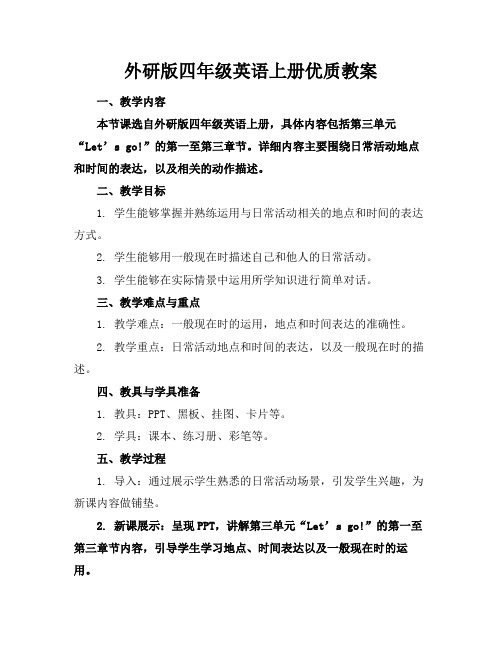
外研版四年级英语上册优质教案一、教学内容本节课选自外研版四年级英语上册,具体内容包括第三单元“Let’s go!”的第一至第三章节。
详细内容主要围绕日常活动地点和时间的表达,以及相关的动作描述。
二、教学目标1. 学生能够掌握并熟练运用与日常活动相关的地点和时间的表达方式。
2. 学生能够用一般现在时描述自己和他人的日常活动。
3. 学生能够在实际情景中运用所学知识进行简单对话。
三、教学难点与重点1. 教学难点:一般现在时的运用,地点和时间表达的准确性。
2. 教学重点:日常活动地点和时间的表达,以及一般现在时的描述。
四、教具与学具准备1. 教具:PPT、黑板、挂图、卡片等。
2. 学具:课本、练习册、彩笔等。
五、教学过程1. 导入:通过展示学生熟悉的日常活动场景,引发学生兴趣,为新课内容做铺垫。
2. 新课展示:呈现PPT,讲解第三单元“Let’s go!”的第一至第三章节内容,引导学生学习地点、时间表达以及一般现在时的运用。
3. 例题讲解:结合PPT,讲解具体例题,让学生了解如何用英语描述日常活动。
4. 随堂练习:分组让学生进行角色扮演,练习日常活动地点和时间的表达,以及一般现在时的描述。
六、板书设计1. Unit 3 Let’s go!2. 内容:地点和时间表达、一般现在时描述日常活动、例句展示。
七、作业设计1. 作业题目:(1)根据所学内容,用一般现在时描述你和朋友的一天。
(2)完成练习册上的相关习题。
答案:(1)例:I get up at 7:00 in the morning. Then I have breakfast. After breakfast, I go to school. I have lunch at school. In the afternoon, I play football with my friends. I go home at 5:00. After dinner, I do my homework and watch TV.(2)见练习册答案。
三起点外研版新标准英语四年级上册期末考试重难点知识点复习及练习
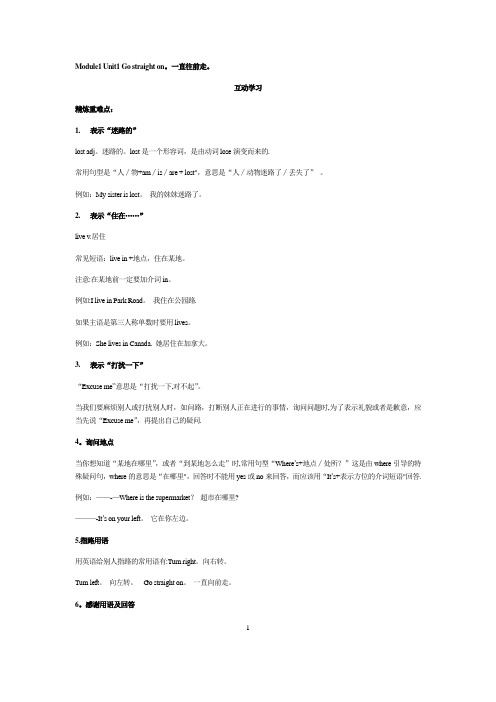
Module1 Unit1 Go straight on。
一直往前走。
互动学习精炼重难点:1.表示“迷路的”lost adj。
迷路的。
lost是一个形容词,是由动词lose演变而来的.常用句型是“人∕物+am∕is∕are + lost",意思是“人∕动物迷路了∕丢失了”。
例如:My sister is lost。
我的妹妹迷路了。
2.表示“住在……”live v.居住常见短语:live in +地点,住在某地。
注意:在某地前一定要加介词in。
例如:I live in Park Road。
我住在公园路.如果主语是第三人称单数时要用lives。
例如:She lives in Canada. 她居住在加拿大。
3.表示“打扰一下”“Excuse me”意思是“打扰一下,对不起”。
当我们要麻烦别人或打扰别人时,如问路,打断别人正在进行的事情,询问问题时,为了表示礼貌或者是歉意,应当先说“Excuse me”,再提出自己的疑问.4。
询问地点当你想知道“某地在哪里”,或者“到某地怎么走”时,常用句型“Where’s+地点∕处所?”这是由where引导的特殊疑问句,where的意思是“在哪里",回答时不能用yes或no来回答,而应该用“It’s+表示方位的介词短语"回答.例如:——-—Where is the supermarket?超市在哪里?———-It’s on your left。
它在你左边。
5.指路用语用英语给别人指路的常用语有:Turn right。
向右转。
Turn left。
向左转。
Go straight on。
一直向前走。
6。
感谢用语及回答1Thank you. 谢谢你。
为感谢用语。
当他人帮助了自己或夸奖、赞美自己时,我们要说“Thank you"来表示感谢。
其回答为:Y ou're welcome。
不用谢.Module2词汇:精炼重难点:1.表示“看……”look 表示“看"的这个动作,是不及物动词.look后面跟人或物时,必须要加上介词at.例如:Look at the English car. 看那辆英国小汽车.口语练习:Look at the teacher∕girl. 看这位教师∕这个女孩.2.表示“这些"these 这些。
外研版四年级英语上册复习知识点归纳总结

外研版四年级英语上册复习知识点归纳总结外研版四年级英语上册是学生在学习英语过程中的重要阶段,该册内容涵盖了英语的基础知识和技能,包括词汇、语法、听力、口语和阅读等。
本文将对该册中的复习知识点进行归纳总结,以帮助学生更好地复习和掌握所学内容。
一、词汇部分1. 单词记忆在本册中,学生需要掌握一些基础的英文单词,如颜色、数字、食物、动物等。
为了更好地记忆这些单词,学生可以通过与图片的配对、单词拼写、造句等方式进行记忆。
2. 词组搭配除了单词的记忆,学生还需要学会一些常用的词组搭配,如"howare you"、"thank you"、"in the morning"等。
通过反复使用这些词组,可以加深记忆,提高语言表达的流利度。
二、语法部分1. 人称代词学生需要学习使用人称代词,包括主格代词(I、you、he、she、it、we、they)和宾格代词(me、you、him、her、it、us、them)。
在句子中正确使用人称代词,能够更准确地表达自己的意思。
2. 句型转换学生需要学会进行句型转换,如将陈述句变为疑问句、将肯定句变为否定句等。
通过练习句型转换,能够加深对句子结构的理解,提高语言运用的灵活性。
三、听力部分1. 听力理解学生需要通过听力练习来提高对英语的听力理解能力。
在听力练习中,要注意听清楚句子中的关键词,理解句子的意思,并能够作出正确的回答。
2. 句子朗读孩子可以通过听力材料中的句子朗读来提高口语表达能力。
在朗读时,要注意语音语调的准确,以及情感的表达,使语言更加地自然和流利。
四、口语部分1. 对话练习学生需要进行一些对话练习,将所学的知识运用到实际交流中。
可以通过与同学、老师或家长进行对话,模仿对话中的语音语调和表情动作,以及练习常用的问候语和交际用语。
2. 自由口语学生还可以通过自由口语来提高口语表达能力。
可以选择一些自己感兴趣的话题进行口语练习,如家庭、朋友、爱好等。
2024年四年级英语外研版上册全册教案标准版,可打印
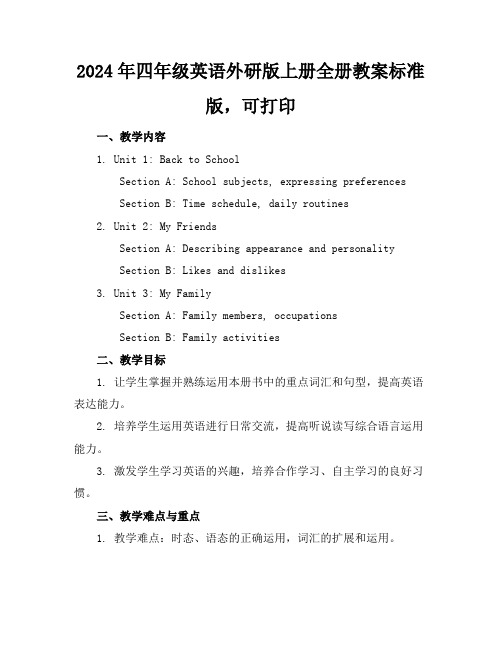
2024年四年级英语外研版上册全册教案标准版,可打印一、教学内容1. Unit 1: Back to SchoolSection A: School subjects, expressing preferencesSection B: Time schedule, daily routines2. Unit 2: My FriendsSection A: Describing appearance and personalitySection B: Likes and dislikes3. Unit 3: My FamilySection A: Family members, occupationsSection B: Family activities二、教学目标1. 让学生掌握并熟练运用本册书中的重点词汇和句型,提高英语表达能力。
2. 培养学生运用英语进行日常交流,提高听说读写综合语言运用能力。
3. 激发学生学习英语的兴趣,培养合作学习、自主学习的良好习惯。
三、教学难点与重点1. 教学难点:时态、语态的正确运用,词汇的扩展和运用。
2. 教学重点:各单元主题相关词汇、句型的掌握,口语表达的准确性。
四、教具与学具准备1. 教具:PPT、录音机、磁带、卡片、挂图等。
2. 学具:课本、练习册、字典、笔记本等。
五、教学过程1. 导入:通过情景引入,展示与单元主题相关的图片、视频等,激发学生的兴趣。
2. 新课内容呈现:讲解新单词、句型,结合实例进行演示,引导学生进行模仿。
3. 例题讲解:针对每个单元的重点、难点,设计典型例题,进行详细讲解。
4. 随堂练习:设计各种形式的练习,巩固所学内容,提高实际运用能力。
5. 小组活动:组织学生进行小组讨论、表演,培养合作精神,提高口语表达能力。
六、板书设计1. 2024年四年级英语外研版上册全册教案2. 内容:各单元重点词汇、句型,板书结构清晰,突出重点。
七、作业设计1. 作业题目:Write a short passage about your school day.Describe your best friend's appearance and personality.Make a family tree and introduce your family members.八、课后反思及拓展延伸1. 反思:根据学生的课堂表现和学习效果,及时调整教学方法,提高教学效果。
Module4(教案)外研版(三起)英语四年级上册
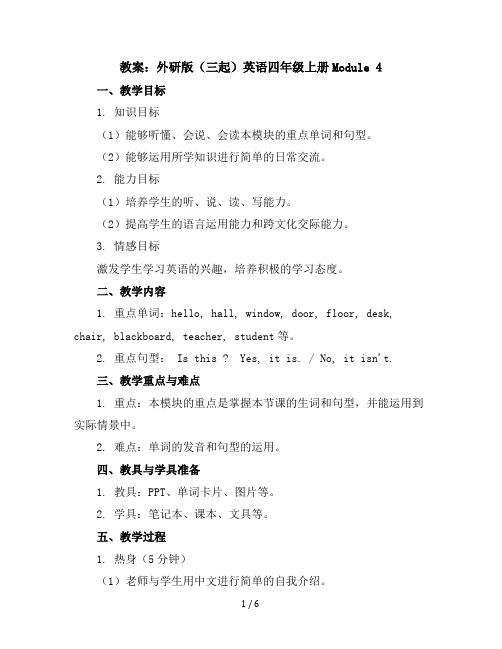
教案:外研版(三起)英语四年级上册Module 4一、教学目标1. 知识目标(1)能够听懂、会说、会读本模块的重点单词和句型。
(2)能够运用所学知识进行简单的日常交流。
2. 能力目标(1)培养学生的听、说、读、写能力。
(2)提高学生的语言运用能力和跨文化交际能力。
3. 情感目标激发学生学习英语的兴趣,培养积极的学习态度。
二、教学内容1. 重点单词:hello, hall, window, door, floor, desk, chair, blackboard, teacher, student等。
2. 重点句型: Is this ? Yes, it is. / No, it isn't.三、教学重点与难点1. 重点:本模块的重点是掌握本节课的生词和句型,并能运用到实际情景中。
2. 难点:单词的发音和句型的运用。
四、教具与学具准备1. 教具:PPT、单词卡片、图片等。
2. 学具:笔记本、课本、文具等。
五、教学过程1. 热身(5分钟)(1)老师与学生用中文进行简单的自我介绍。
(2)学生模仿老师的自我介绍,并用中文介绍自己的朋友。
2. 导入(10分钟)(1)老师出示图片,引导学生说出对应的中文词语。
(2)学生尝试用英语说出对应的单词。
3. 呈现(10分钟)(1)老师出示单词卡片,引导学生读出单词。
(2)老师用单词卡片搭建一个简单的教室场景,引导学生用英语描述。
4. 练习(10分钟)(1)学生分成小组,用英语描述自己的教室。
(2)每个小组选出一个代表进行汇报。
5. 巩固(5分钟)(1)老师出示图片,引导学生用英语描述。
(2)学生进行角色扮演,运用所学知识进行对话。
6. 拓展(5分钟)(1)老师引导学生思考:我们的学校有哪些特点?(2)学生用英语进行表达。
六、板书设计1. 单词:hello, hall, window, door, floor, desk, chair, blackboard, teacher, student2. 句型: Is this ? Yes, it is. / No, it isn't.七、作业设计1. 抄写单词和句型。
一年级起点外研版四年级英语上册(最新版)
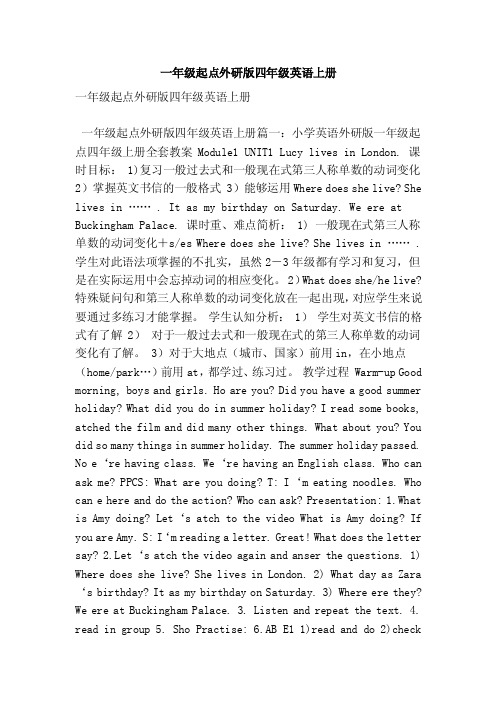
一年级起点外研版四年级英语上册一年级起点外研版四年级英语上册一年级起点外研版四年级英语上册篇一:小学英语外研版一年级起点四年级上册全套教案 Module1 UNIT1 Lucy lives in London. 课时目标: 1)复习一般过去式和一般现在式第三人称单数的动词变化2)掌握英文书信的一般格式 3)能够运用Where does she live? She lives in …… . It as my birthday on Saturday. We ere at Buckingham Palace. 课时重、难点简析: 1) 一般现在式第三人称单数的动词变化+s/es Where does she live? She lives in …… . 学生对此语法项掌握的不扎实,虽然2-3年级都有学习和复习,但是在实际运用中会忘掉动词的相应变化。
2)What does she/he live? 特殊疑问句和第三人称单数的动词变化放在一起出现,对应学生来说要通过多练习才能掌握。
学生认知分析: 1)学生对英文书信的格式有了解 2)对于一般过去式和一般现在式的第三人称单数的动词变化有了解。
3)对于大地点(城市、国家)前用in,在小地点(home/park…)前用at,都学过、练习过。
教学过程 Warm-up Good morning, boys and girls. Ho are you? Did you have a good summer holiday? What did you do in summer holiday? I read some books, atched the film and did many other things. What about you? You did so many things in summer holiday. The summer holiday passed. No e‘re having class. We‘re having an English class. Who can ask me? PPCS: What are you doing? T: I‘m eating noodles. Who can e here and do the action? Who can ask? Presentation: 1.What is Amy doing? Let‘s atch to the video What is Amy doing? If you are Amy. S: I‘m reading a letter. Great! What does the letter say? 2.Let‘s atch the video again and anser the questions. 1) Where does she live? She lives in London. 2) What day as Zara ‘s birthday? It as my birthday on Saturday. 3) Where ere they? We ere at Buckingham Palace. 3. Listen and repeat the text. 4. read in group 5. Sho Practise: 6.AB E1 1)read and do 2)checkthe anser 7. Talk about your birthday. It as my birthday on Monday. We ere at Guanxiangshan Park. Who can talk about yours?8.Book Practise3 1)give an example 2)do in pairs 3)sho 9.AB E3 E4 1)ask and aner 2)sho 4)rite don 板书: Module 1 Unit 1 Lucy lives in London What is she doing? She‘s reading a letter. What does she live ? She lives in London. 作业: 1)listen and repeat the text 5 times 2)retell the ords. Module1 UNIT2 I ve got a ne friend. 教学目标: 5. 阅读和学写英文信及回信 6. 复习现在时态和过去时态教学重难点及突破措施: 5. 英文信格式 6. 含有be 动词的过去时态句型. 措施: 5. 强调英文信称呼,正文,结束语,写信人都顶格写 6. 含有be动词的句子变过去时: am /is变为 as ; are变为ere . 1.text: .Listen and repeat. ● Have the students dra a picture of something they on. They must take turns to guess the other student‘s picture. Examples A: I‘ve got a picture of something. B: Is it a pet? A: No, it isn‘t. B: Is it a toy? A: Yes. B: Is it a toy train? A: No. B: Is it a toy car? A: Yes, it is. 一年级起点外研版四年级英语上册篇二:外研社版新标准小学英语唱“Hello”歌师生互相问候Hello! /Hi! 学生将胸卡戴在胸前,分别起立做自我介绍。
小学英语外研新标准(一起)四年级上册(2022年新编)Module8Module8

2023年秋组内随堂教研课《Module 8 Unit 1 When did they come?》德阳市第一小学校英语组李宏琼一、教材分析一般过去时是四年级学习的一个重要语法点,它贯穿了整册教材,本模块的主要内容是使用一般过去时的特殊疑问句询问过去的行为。
本单元是第一单元, 主要讲述的是Amy和Ms. Smart在读报的过程中了解到一些英国孩子上周来中国参加音乐比赛,一个吹笛子的女孩还获得了金奖杯。
Amy告诉妈妈她也会吹笛子, 但是她的演奏实在糟糕,妈妈告诉她还需要多加练习。
二、学情分析四年级的学生活泼好动,注意不稳定、不持久,难于长时间地注意同一件事物,容易为一些新奇刺激的事物所吸引。
所以他们对课件里的动画和声音感兴趣。
知识方面:四年级的学生对过去时态的学习已有了一定的基础,能够正确地运用“Did you…?”等一般疑问句句型来进行问答交流。
三、教学目标a.语言知识目标:掌握目标语句:When did they come? They came last Wednesday. What did she play? She played the flute. What did she win? She won the gold cup.单词:when, came, competition, won, gold, cup, flute, practiceb.语言技能目标:100%学生能够听懂会说本模块重点句型,80%学生能够灵活运用功能句,询问别人过去发生的事情并能做出正确回答。
其余20%的学生能够在同伴的帮助下达成此目标。
c.情感态度目标:积极培养自己的兴趣爱好,能够平衡学习和娱乐;小组合作意识强烈,积极参加比赛,大胆表现自我。
d.学习策略:任务驱动,多学少教,小组合作。
四、教学重点.掌握单词:when, came, competition, won, gold, cup, flute,practice1.掌握目标语句:When did they come? They came last Wednesday.What did she play? She played the flute.What did she win? She won the gold cup.五、教学难点1.在情境中熟练运用一般过去时特殊疑问句谈论过去发生的事情;2.正确区分what, when的用法。
2024年四年级英语外研版上册全册教案
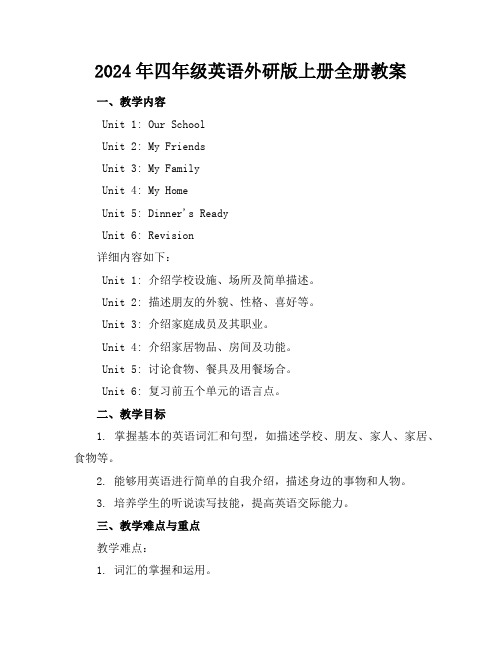
2024年四年级英语外研版上册全册教案一、教学内容Unit 1: Our SchoolUnit 2: My FriendsUnit 3: My FamilyUnit 4: My HomeUnit 5: Dinner's ReadyUnit 6: Revision详细内容如下:Unit 1: 介绍学校设施、场所及简单描述。
Unit 2: 描述朋友的外貌、性格、喜好等。
Unit 3: 介绍家庭成员及其职业。
Unit 4: 介绍家居物品、房间及功能。
Unit 5: 讨论食物、餐具及用餐场合。
Unit 6: 复习前五个单元的语言点。
二、教学目标1. 掌握基本的英语词汇和句型,如描述学校、朋友、家人、家居、食物等。
2. 能够用英语进行简单的自我介绍,描述身边的事物和人物。
3. 培养学生的听说读写技能,提高英语交际能力。
三、教学难点与重点教学难点:1. 词汇的掌握和运用。
2. 句型的构造和实际应用。
3. 提高学生的听说能力。
教学重点:1. 基本词汇的学习和巩固。
2. 句型的灵活运用。
3. 提高学生的语言表达能力。
四、教具与学具准备教具:PPT、卡片、挂图、录音机、磁带、多媒体设备等。
学具:练习册、彩色笔、词汇卡片、作业本等。
五、教学过程1. 导入:通过图片、歌曲、游戏等形式引入新课,激发学生的学习兴趣。
2. 呈现:展示新课内容,引导学生学习新词汇和句型。
3. 实践:设置实践情景,让学生进行角色扮演、小组讨论等活动,巩固所学知识。
4. 互动:进行师生互动、生生互动,提高学生的听说能力。
5. 巩固:通过例题讲解、随堂练习,巩固所学内容。
7. 作业布置:布置作业,明确作业要求。
六、板书设计1. 新词汇和句型。
2. 重点语法和语言点。
3. 例题及答案。
七、作业设计1. 作业题目:根据所学内容,编写一段自我介绍。
描述你的家庭和房间。
列出你喜欢的食物和餐具。
答案示例:Selfintroduction: My name is Tom. I am a student in Grade 4. I have many friends at school.Family and room: I have a happy family. There are three rooms in my house, including a living room, a bedroom and a kitchen.Favorite food and tableware: My favorite food is pizza.I like to eat with a knife and fork.八、课后反思及拓展延伸2. 拓展延伸:布置课后实践作业,鼓励学生在生活中运用所学英语进行交流,提高实际应用能力。
- 1、下载文档前请自行甄别文档内容的完整性,平台不提供额外的编辑、内容补充、找答案等附加服务。
- 2、"仅部分预览"的文档,不可在线预览部分如存在完整性等问题,可反馈申请退款(可完整预览的文档不适用该条件!)。
- 3、如文档侵犯您的权益,请联系客服反馈,我们会尽快为您处理(人工客服工作时间:9:00-18:30)。
Module 1Words:1 read a letter2 live in3 very well4 a bit5 cold6 birthday7 Saturday8 a photo of9 birthday party 10 nice 11 another 12 Buckingham Palace13 happy 14 soon 15 write to... 16 about 17 tiger 18 eleven 19 next year 20 warm 21 cleverSentences:1.Where is my desk?2.It was there.3.It was here.4.What are you doing?5.I’m reading a letter.6.It’s from my friend Lucy.7.Where does she live?8.She lives in London.9.I’m very well.10.London is a bit cold now.11.Is it cold in Beijing?12.It was my birthday on Saturday.13.Now I’m nine.14.Here is a photo of my birthday party.15.The girl in red is my new friend.16.She’s got long, black hair.17.She’s very nice.18.Here is another photo of Zara and me.19.We were at Buckingham Palace.20.We were very happy.21.Write to me soon.22.Tell me about your friends.23.I’ve got a new friend.24.He’s a tiger.25.He’s got short, yellow hair.26.Thank you for your letter.27.Happy birthday to you!28.I’m ten now.29.I will be eleven next year.30.Beijing isn’t cold now.31.It’s warm.32.I’ve got a new friend.33.She’s g ot short hair.34.She’s very clever.35.We were at the Great Wall.36.Children from China are Chinese.37.Children from England are English.38.We all love fum.39.Children of the world, we are all one.40.Children from America are American.41.Children Russia are Russian.Module 2Words:1 wash2 shirt3 skirt4 yesterday5 clean6 clean my room7 finish8 homework 9 finish my homework 10 trousers 11 dirty 12 last Sunday13 cook 14 noodles 15 phone 16 watch TV 17 paint 18 paint a picture19 play the flute 20 play with 21 listen to music 22 play football 23 sweetsSentences:1.I washed my shirt.2.I washed my skirt.3.Yesterday, I cleaned my room.4.I finished my homework.5.My trousers were very dirty.6.I washed them.7.Then I helped my mum.8.She was very happy.9.You are a very good boy.st Sunday, I cooked noodles.11.He cooked noodles.12.Yesterday, Mr Smart cooked noodles.13.Tom helped him.14.Ms Smart phoned Grandma.15.Sam watched TV.16.Amy painted a picture.17.She painted a picture.18.She watched TV.19.She played the flute.20.She played with me.21.He listened to music.22.He played football.23.He helped his mother.24.There were sweets for all.Module 3Words:1.didn’t 2 usually 3 get up 4 on Mondays 5 walk to school 6 walk to...7.at school 8 on Sundays 9 ride a bike 10 ride a bike to the park 11 stay12 boring 13 stay at home 14 talk on the phone 15 walk to the parkModule 3Sentences:1.I finished my homework.2.You didn’t finish your homework.3.Lingling usually gets up at seven on Mondays.4.But she didn’t get up at seven yesterday.5.She usually walks to school.6.But she didn’t walk to school yesterday.7.She usually has English at school.8.But she didn’t have it yesterday.9.Yesterday was National Day!10.Lingling watched TV and played with her toys.11.On Sundays, I usually ride my bike to the park.12.And I usually play football in the park.13.But I didn’t ride my bike yesterday.14.And I didn’t play football in the park.15.It was raining.16.I stayed at home and cleaned all the rooms.17.What a boring day!18.Today is National Day.19.I didn’t go to school today.20.I stayed at home.21.I talked on the phone.22.And I walked to the park to play.Module 4Words:1 boat2 bike3 invent4 clever5 Chinese people6 important7 important things8 paper9 printing 10 newspaper 11 between 12 mouse 13 mice(mouse复数)14 beside 15 in front of 16 bicycle 17 invent-----invented18 print----printedSentences:1.what’s this?2.It’s a boat.3.And it’s a bike,too.4.I invented it.5.You are so clever!6.Chinese people invented many important things.7.Chinese people are very clever.8.Chinese people invented paper.9.Chinese people invented printing.10.We print books and newspapers.11.That’s right.12.I printed our class newspaper yesterday.13.Where is it?14.It’s between the chairs.15.Look at the mouse.16.It’s beside the house.17.It’s in front of the cat.18.Look at the man beside the bicycle.19.He invented this bicycle.20.He was from the UK.21.Look at the man between the two cars.22.He invented these cars.23.He was from the US.Module 5Words:1 river2 sister3 monkey4 tip5 minute6 climb7 top8 mountain9 lots of 10 candy---candies 11 beautiful 12 plant 13 a good time 14 present 15 a picture of ...16 go skating 17 a school trip 18 warm clothes 19 ice 20 at first 21 fall over 22 easy 23 really 27 fun 28 lovely 29 go out 30 climb up 31 next toSentences:1.I went to the river2.I saw your sister.3.I went to the party.4.I saw a monkey.5.Did you go on a school trip yesterday?6.We went to the Great Wall.7.It took us fifty minutes to climb to the top.8.And we saw lots of mountains.9.We ate candies.10.An we saw some beautiful plants.11.You had a good time.12.And we bought you a present.13.It’s a picture of the Great Wall.14.I saw the pig yesterday.15.He went skating.16.A pig went skating.17.Yesterday, we went on a school trip.18.We went skating.19.I wore warm clothes.20.The ice was very cold.21.At first, I fell over.22.But it didn’t hurt a lot.23.Then I was able to skate.24.It was easy!25.And I didn’t fall over again.26.It was really fun.27.We had a lovely day.28.We went out yesterday.29.We saw a wall.30.It was big and tall.31.And we walked a long, long way.32.We climbed up the Great Wall.33.And we didn’t fall.34.We ate a cake next to a lake.35.And we finished it all.。
